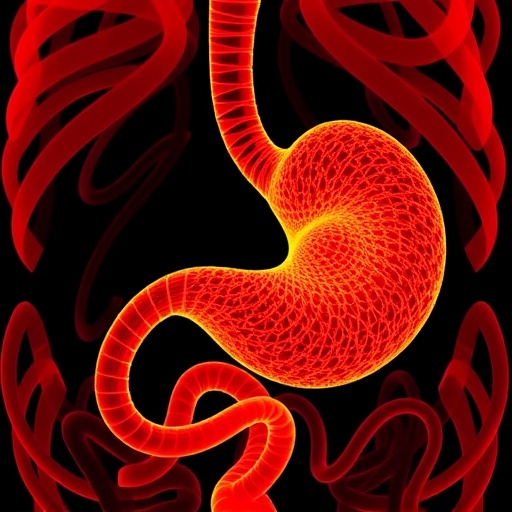The landscape of pancreatic cancer treatment is shifting as new findings shed light on the nuances of early-onset pancreatic cancer (EOPC) and its response to adjuvant therapies. In a recent and comprehensive retrospective cohort study harnessing data from the Surveillance, Epidemiology, and End Results (SEER) database spanning from 2006 to 2019, researchers have illuminated a significant survival advantage for younger pancreatic cancer patients who undergo adjuvant chemotherapy (ACT) following neoadjuvant chemotherapy (NACT) and surgical intervention. This investigation demarcates early-onset cases—defined as those diagnosed before the age of 50—from average-onset pancreatic cancer (AOPC) cases, highlighting the profound disparities in patient outcomes and therapeutic efficacy.
Early-onset pancreatic ductal adenocarcinoma, an increasingly recognized subset of pancreatic malignancies, has historically been overshadowed by research predominantly focused on older populations. Despite its rising incidence, optimal treatment strategies for EOPC remain inadequately defined. This void in clinical understanding has spurred an inquiry into whether adjuvant chemotherapy confers a statistically and clinically relevant benefit after the more contemporary management approach of administering neoadjuvant chemotherapy prior to resection.
Leveraging propensity score matching to control for differences in critical covariates such as tumor stage, lymph node involvement, and receipt of radiotherapy, the study meticulously compared the overall survival (OS) and cancer-specific survival (CSS) between EOPC patients and their older counterparts with AOPC. This methodological rigor strengthens the findings, mitigating biases common in retrospective analyses and enhancing the reliability of the conclusions drawn.
The results were compelling. Among the matched cohorts of 124 EOPC and 124 AOPC patients, those in the early-onset group demonstrated a markedly longer median OS of 41 months, in contrast with 29 months observed in AOPC patients. Cancer-specific survival echoed this pattern, with a median of 48 months in EOPC versus 30 months in the older group, underscoring a robust survival advantage intrinsic to younger patients when treated with the outlined regimen.
Of paramount clinical relevance was the independent prognostic value attributed to adjuvant chemotherapy in the early-onset subgroup. Multivariate Cox regression models revealed that ACT reduced the hazard of death by approximately 50% (HR = 0.495 for OS; HR = 0.419 for CSS), a statistically significant finding substantiated by p-values well below the conventional threshold. Conversely, this survival benefit with ACT was not substantiated in the AOPC cohort, suggesting age-related or tumor biology-related differentials in chemotherapy responsiveness.
Delving deeper, subgroup analyses identified that individuals with stage II disease—characterized by the extent of tumor progression and nodal involvement—garnered the most pronounced survival gains from adjuvant chemotherapy in the early-onset group. This is particularly insightful for clinical decision-making, suggesting that tumor staging remains critical in tailoring postoperative treatment plans, especially in younger patients who might tolerate and benefit from intensified therapeutic regimens.
From a biological and molecular standpoint, these findings prompt intriguing questions about the pathophysiology of pancreatic tumors arising in younger individuals. Potentially distinct genetic, epigenetic, or microenvironmental factors might underlie the differential responses, a fertile ground for future translational research. Understanding these mechanisms could pave the way for precision medicine approaches that optimize patient stratification and treatment customization.
The clinical implications extend beyond survival metrics. Early-onset patients, who are often in the prime of their lives, stand to gain not only longevity but potentially improved quality of life with effective adjuvant therapies that minimize recurrence risk. Recognizing the superior outcomes associated with ACT in this subgroup could lead to refined guidelines and encourage oncologists to adopt more aggressive, yet evidence-based, postoperative chemotherapy protocols when appropriate.
It is essential to consider the study’s retrospective nature and reliance on registry data, which, while rich in patient numbers and clinical details, inherently entails limitations such as unmeasured confounders and data heterogeneity. Prospective clinical trials are imperative to validate these findings and explore the underlying mechanisms driving the observed survival disparities. Such trials could also evaluate novel chemotherapeutic agents or combinations tailored to molecular profiles characteristic of EOPC.
Furthermore, this research highlights the critical importance of integrating age-specific analyses in oncological studies—a practice that could unmask treatment nuances and optimize outcomes across demographic spectra. The traditional one-size-fits-all paradigm is increasingly untenable, and studies such as this reinforce the shift towards personalized oncology.
In conclusion, the evidence amassed from this comprehensive SEER-based retrospective study establishes that early-onset pancreatic cancer patients derive significant survival benefits from adjuvant chemotherapy following neoadjuvant therapy and surgical resection, a benefit not mirrored in average-onset counterparts. These findings advocate for a recalibration of therapeutic strategies to embrace age-specific considerations and underscore the urgent necessity for prospective validation to refine clinical practice guidelines. As the oncology community continues to unravel the complexities of pancreatic cancer, tailored interventions hold promise to markedly improve prognoses for younger patients facing this formidable disease.
Subject of Research: Early-onset pancreatic cancer treatment outcomes and the role of adjuvant chemotherapy following neoadjuvant therapy and surgery.
Article Title: Adjuvant Chemotherapy Improves Survival in Resected Early-onset Pancreatic Cancer after Neoadjuvant Therapy: A Retrospective Cohort Study Based on the SEER Database
News Publication Date: 6-Jun-2025
Web References:
- Oncology Advances: https://www.xiahepublishing.com/journal/oncoladv
- DOI: http://dx.doi.org/10.14218/OnA.2025.00008
Keywords: Pancreatic cancer, Early-onset pancreatic cancer, Adjuvant chemotherapy, Neoadjuvant chemotherapy, Survival outcomes, Pancreatic ductal adenocarcinoma, Retrospective cohort study, SEER database, Oncology Advances




